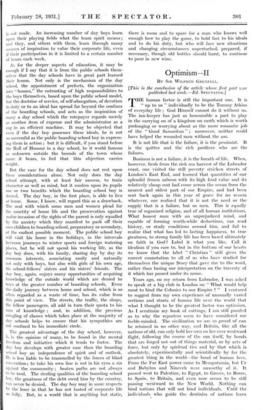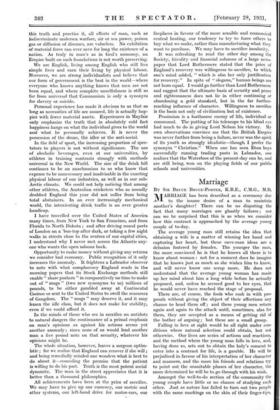Optimism—II
BY SIR WILFRED GRESFELL.
[This is the conclusion of the article whose first part was published last week.—Ed. SPECTATOR.] THE human factor is still the important one. It is "up to us" individually to be the Tommy Atkins of everyday life ; God Himself cannot do it without us. The inn-keeper has just as honourable a part to play in the carrying on of a kingdom on earth which is worth prolonging or worrying about as the more romantic job of the "Good Samaritan " ; moreover, neither could have helped the wounded man without the ass.
It is not life that is the failure, it is the pessimist. It is the quitter and the rich profiteer who are the failures.
Business is not a failure, it is the breath of life. When, however, fresh from the rich sea harvest of the Labrador coast, one visited the still poverty stricken streets of London's East End, and learned that quantities of our splendid frozen salmon with its high food value and its relatively cheap cost had come across the ocean from the nearest and oldest part of our Empire, and had been sent back again in this year of grace for no reason whatever, one realized that it is not the need or the supply that is a failure, but us men. This is equally true of organized religion, and of all human institutions. What honest man with an unprejudiced mind, and capable of forming worth-while deductions, can read history, or study conditions around him, and fail to realize that what has led to lasting happiness, to true greatness, to strong family life has been based ultimately on faith in God ? Label it what you like. Call it idealism if you care to, but in the bottom of our hearts we know that the label " Christian " still gives the correct connotation to all of us who have studied for themselves the unique Story that gave rise to the word, rather than basing our interpretation on the travesty of it which has passed under its name.
Years ago, on my return from Labrador, I was asked to speak at a big club in London on "What would help most to bind the Colonies to our Empire ? " I ventured to suggest from my own experience of unusually varied sections and strata of human life over the world that what I thought to be the greatest factor was optimism. As I scrutinize my book of cuttings, I am still puzzled as to why the reporters seem to have considered me feeble-minded. The civilization we are so proud of can be retained in no other way, and Britain, like all the nations of old, can only hold her own on her ever westward flight, following the course of the sun itself, by bonds that are forged not out of things material, or by acts of force, but only by spiritual ties and by that which is absolutely, experimentally and scientifically by far the greatest thing in the world—the bond of human love. From the Far East power came to Mesopotamia, but Ur and Babylon and Nineveh were unworthy of it. It passed west to Palestine, to Egypt, to Greece, to Rome, to Spain, to Britain, and even now seems to be still passing westward to the New World. Nothing can bind nations that will not bind individuals. Until the individuals. who 'guide the• destinies of nations learn this truth and practise it, all efforts of man, such as indiscriminate undersea warfare, air or sea power, poison gas or diffusion of diseases, are valueless. No exhibition of material force can ever save for long the existence of a nation. As truly in man's as in God's economy, an Empire built on such foundations is not worth preserving.
We are English, living among English who still live simple lives and earn their living by physical labour. Moreover, we are strong individualists and believe that our form of government is the best in the world—where everyone who knows anything knows that men are not born equal, and where complete unselfishness is still so far from universal that Communism is only a synonym for slavery or suicide.
Personal experience has made it obvious to us that so long as necessities of life are assured, life is actually hap- pier with fewer material assets. Experiences in Mayfair only emphasize the truth that in absolutely cold fact happiness hangs on what the individual gives to the world and what he personally achieves. It is never the possession of the drone, the idler or the anti-social.
In the field of sport, the increasing proportion of spec- tators to players is not without significance. The use of alcoholic beverages, even at our universities, by athletes in training contrasts strongly with methods universal in the New World. The size of the drink bill continues to be an anachronism to us who know that expense to be unnecessary and inadvisable in the exacting physical labour of our industries, as well as in our sub- Arctic climate. We could not help noticing that among other athletes, the Australian cricketers who so soundly drubbed England this year did not suffer from being total abstainers. In an ever increasingly mechanical world, the intoxicating drink traffic is an ever greater handicap.
I have travelled over the United States of America many times, from New York to San Francisco, and from Florida to North Dakota ; and after driving round parts of London on a 'bus-top after dark, or taking a few night walks in streets close to the centres of our capital cities, I understand why I never met across the Atlantic any- one who wants the open saloons back.
Opportunity to make money without giving any returns we consider bad economy. Public recognition of it only increases the anomaly. It frightens a Labrador observer to note with what complacency England reads in the morning papers that its Stock Exchange methods still enable" share pushers "in comparatively no time to make out of " mugs " (two new synonyms to us) millions of pounds, to be either gambled away at Continental Casinos or sent to the United States to swell the resources of Gangdom. The " mugs " may deserve it, and it may lessen the idle class, but it does not make for stability, even if we could afford it.
In the minds of those who see in sacrifice an antidote to natural dangers the continuance of a primal emphasis on man's opinions as against his actions seems yet another anomaly; since none of us would lend another man a five pound note on that security, whatever his opinions might be.
The whole situation, however, leaves a surgeon optim- istic; for we realize that England can recover if she will ; and being remedially minded one wonders what is best to do about it—conceding the premise that the patient is willing to do his part. Truth is the most potent social dynamite. The man in the street appreciates that it is better than a thousand philosophies.
All achievements have been at the price of sacrifice. We may have to give up our currency, our metric and other systems, our left-hand drive for motor-cars, our • fireplaces in favour of the more sensible and economical central heating, our tendency to try to force others to buy what we make, rather than manufacturing what they want to purchase. We may have to sacrifice insularity.
It was refreshing to read the other day among the Society, frivolity and financial columns of a large news- paper that Lord Rothermere stated that the price of England's recovery was willingness to sacrifice, to which one's mind added, "which is also her only justification for recovery." In spite of "slogans," human beings are not born equal. I would go further than Lord Rothermere and suggest that the ultimate basis of security and peace and righteousness does not lie in either continuing or abandoning a gold standard, but in the far further- reaching influence of character. Willingness to sacrifice is the basis not only of civilization but of existence.
Pessimism is a loathsome enemy of life, individual or communal. The putting of his telescope to his blind eye had much to do in giving Lord Nelson his victory. My own observations convince me that the British Empire was never further from being a failure, never was the spirit of its youth so strongly idealistic—though I prefer the synonym "Christian." When one has seen Eton boys successfully running trading posts in Labrador, one realizes that the Waterloos of the present-day can be, and are still being, won on the playing fields of our public schools and universities.












































 Previous page
Previous page